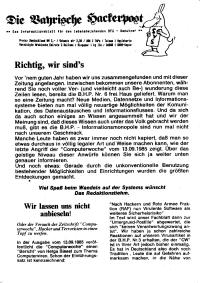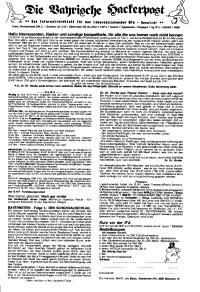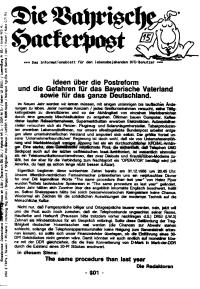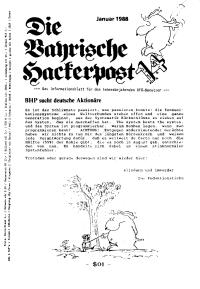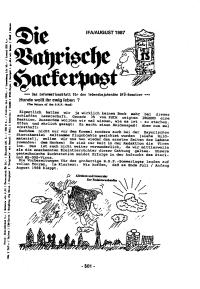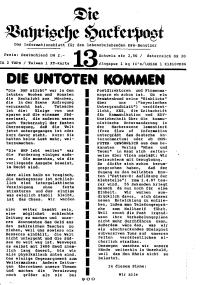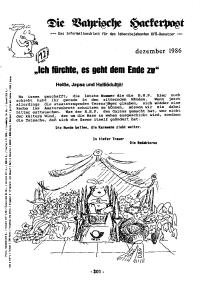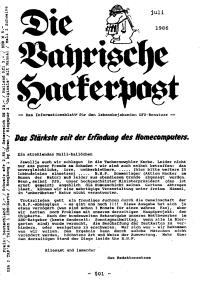Copy Link
Add to Bookmark
Report
NL-KR Digest Volume 02 No. 35

NL-KR Digest (5/04/87 16:08:00) Volume 2 Number 35
Today's Topics:
Seminar - English as a Functional Programming Language - Steedman
Automatic Speech Understanding for Naval Battle Management
CALL FOR PAPERS: ACL Applied Natural Language Conference
Conference - AI and Law - Final Schedule
----------------------------------------------------------------------
Date: Wed 29 Apr 87 13:54:23-CDT
From: Kent Wittenburg <HI.WITTENBURG@MCC.COM>
Subject: Seminar - English as a Functional Programming Language - Steedman
MCC Human Interface Program
presents a talk by
Mark Steedman
Dept. of Computer and Information Science,
Univ. of Pennsylvania
and Dept. of AI and Centre for Cognitive Science,
Univ. of Edinburgh.
Thursday, May 7th
1:30 - 3:00
MCC
Balcones Research Center
ACA Conference Room 2.806
(Abstract)
English as a Functional Programming Language
Combinatory grammars extend the Categorial Grammars of
Ajdukiewicz using operations related to the combinators of
Curry, such as functional composition and type-raising. In
a prior talk at UT, I show that this theory provides a
natural account of coordination. The present talk begins by
showing that the analysis extends to the phenomenon of
"parasitic gaps". A new combinatory rule related to one of
Curry's most fundamental primitive combinators is required.
The possible realisations of the rule are limited by the
putatively universal Principles of Adjacency, Directional
Consistency, and Directional Inheritance, which thereby
correctly predict certain constraints on this variety of
unbounded dependency.
The talk continues by asking why natural language gram-
mars should include combinator-like operations at all, and
why these combinators in particular should be involved. The
suggestion is that natural syntax is a very transparent
reflection of an applicative system resembling the lambda
calculus in expressing the notion of abstraction, but which
exploits the computational advantages of operations that
eschew bound variables, and which have a "recoverability"
property.
The property of recoverability in turn provides the
basis for a technique due to Pareschi for parsing in the
face of the proliferating semantically equivalent surface
analyses engendered by the combinatory rules. This tech-
nique, called "lazy" chart parsing, is entirely transparent
to the grammar itself. The conclusion is that the syntax,
semantics, and processors for natural languages may be more
directly related than previous theories have made them
appear.
NOTE:
Please RSVP to Lisa Smith (338-3237) or Sandy Keller (338-3361)
by May 6th. Space is limited.
Visitors to MCC please plan to arrive 15 minutes ahead of
time in order to be checked in and given badges at the front
reception desk at 3500 West Balcones Center Drive, Austin, TX.
------------------------------
Date: 4 May 1987 1216-PDT (Monday)
From: gross@nprdc.arpa
Subject: Seminar - Automatic Speech Understanding for Naval Battle Management
SICNATLANG MEETING
(SICNATLANG = Special Interest Committee in Natural Language)
(SIGART is part of ACM and SICNATLANG is part of SIGART)
Date: May 4
Time: 6:30 p.m.
Place: UCSD, Psych and Ling Bldg., Rm 3118
(CRL Conference Room)
Speaker: Dr. Peter Benson, IT&T
E-mail: dcdwest!benson@sdcsvax.ucsd.edu
Title: Automatic Speech Understanding for Naval Battle Management
This talk will describe "the real stuff." Peter will talk about
speech understanding not just recognition.
See you there! Contact Beth Sundheim or Michelle Gross if you need more
information.
Email addresses: sundheim@nosc.mil, gross@nprdc.arpa.
phone: Beth at work on Monday at 225-7778. (As Beth is out of town, you
may want to ask for Janell Baran).
Michelle: 225-6436
------------------------------
Date: Mon, 27 Apr 87 18:02:30 edt
From: walker@flash.bellcore.com (Don Walker)
Subject: CALL FOR PAPERS: ACL Applied Natural Language Conference
"CALL FOR PAPERS"
SECOND CONFERENCE ON APPLIED NATURAL LANGUAGE PROCESSING
9-12 February 1988, Austin, Texas, USA
Organized by the Association for Computational Linguistics
CONFERENCE SUMMARY: This meeting will focus on the application of
natural language processing techniques to real world problems. It will
include invited and contributed papers, panel discussions, tutorials,
exhibits, and demonstrations. Original papers are being solicited in
areas such as human-machine interfaces (including databases, expert
systems, report writers, etc.), speech input and output, information
retrieval, text generation, machine translation, office automation,
writing aids, computer-aided instruction, tools for natural-language
processing, and applications to medical, legal, or other professional
areas. Papers may present applications, evaluations, limitations, and
general tools and techniques. Papers that critically evaluate a
formalism or processing strategy are especially welcome. Papers or
panel proposals discussing end-user experience with natural language
systems are also encouraged.
REQUIREMENTS FOR SUBMISSION: Authors should submit ten copies of a 6-8
page summary (single-spaced, exclusive of references, pica or elite
size type). The first page should begin with the title, the name(s) of
the author(s), complete address(es), and a short (5-6 line) abstract.
Papers should be sent to: Bruce Ballard
AT&T Bell Laboratories, 3C-440A
Murray Hill, NJ 07974
(201)582-5440
allegra!bwb@ucbvax.berkeley.edu
The submission should identify distinctive aspects of the work and
clearly indicate the extent to which an implementation has been
completed; vague or unsubstantiated claims will be given little
weight. Submissions should be substantively different from papers
currently under review or to be submitted elsewhere before the
notification date. All papers will be reviewed by members of the
Program Committee , which is composed of Bruce Ballard, chair (AT&T
Bell Laboratories), Madeleine Bates (BBN Laboratories), Tim Finin
(University of Pennsylvania), Ralph Grishman (New York University),
Carole Hafner (Northeastern University), George Heidorn (IBM
Corporation), Paul Martin (SRI International), Graeme Ritchie
(University of Edinburgh), and Harry Tennant (Texas Instruments).
SCHEDULE: Papers must be received by September 1, 1987. Notification
of acceptance will be sent by October 5, 1987. Camera-ready versions
of the full paper must be received by November 30, 1987.
OTHER ACTIVITIES: The meeting will include one day of tutorials by
noted contributors to the field. Facilities for exhibits and system
demonstrations will also be available. Persons wishing to arrange an
exhibit or present a demonstration should contact Kent Wittenburg or
Carl Weir, MCC, 3500 W. Balcones Center Drive, Austin, TX 78759;
(512)338-3626 or 338-3616; wittenburg@mcc.com or weir@mcc.com.
CONFERENCE INFORMATION: Local arrangements are being handled by
Jonathan Slocum and Barbara Smith, MCC, 3500 W. Balcones Center Drive,
Austin, TX 78759; (512)338-3571 and 338-3527; slocum@mcc.arpa and
barbara@mcc.arpa. For additional information on the conference or
about the ACL, contact Donald Walker, Bell Communications Research, 445
South Street, MRE 2A379, Morristown, NJ 07960; (201)829-4312;
walker@flash.bellcore.com or ucbvax!bellcore!walker. In addition to
the persons named above, the Conference Committee includes Norman
Sondheimer, USC/Information Sciences Institute, General Chair; Martha
Palmer, UNISYS, Tutorials; Jeffrey Hill and Brenda Nashawaty,
Artificial Intelligence Corporation, Publicity.
------------------------------
Date: Fri, 1 May 87 15:28:11 ADT
From: hafner%corwin.ccs.northeastern.edu@RELAY.CS.NET
Subject: Conf. on AI and Law - Final Schedule
The First
International Conference on Artificial Intelligence and Law
May 27-29, 1987
Northeastern University, Boston, MA 02115
Sponsored by:
The Center for Law and Computer Science,
Northeastern University
In Cooperation with ACM SIGART
Registration: Ms. Rita Laffey, (617) 437-3346
Information: Prof. Carole Hafner (617) 437-5116
SCHEDULE OF EVENTS
WEDNESDAY, May 27
8:30-12:30 Tutorials
A. "Introduction to Artificial Intelligence (for lawyers)"
Prof. Edwina L. Rissland, University of Massachusetts and
Harvard Law School
B. "Applying Artificial Intelligence to Law: Opportunities
and Challenges"
Profs. Donald H. Berman and Carole D. Hafner, Northeastern
University
2:00-2:30 Welcome; Opening Remarks.
2:30-4:00 Legal Expert Systems I
2:30 "Expert Systems in Law: Out of the Research Laboratory and
into the Marketplace"
Richard E. Susskind
Ernst & Whinney, London, England
3:00 "Expert Systems in Law: The DataLex Project"
Graham Greenleaf, Andrew Mowbray and Alan L. Tyree
University of Sydney, Australia
3:30 "Explanation for an Expert System that Performs Estate
Planning"
Dean A. Schlobohm and Donald A. Waterman
Stanford University, The Rand Corporation
4:00-4:30 Coffee
4:30-6:00 Conceptual Legal Retrieval Systems I
4:30 "Conceptual Legal Document Retrieval Using the RUBRIC System"
Richard M. Tong, Clifford A. Reid, Peter R. Douglas and
Gregory J. Crowe
Advanced Decision Systems
5:00 "Conceptual Organization of Case Law Knowledge Bases"
Carole D. Hafner
Northeastern University
5:30 "Designing Text Retrieval Systems for Conceptual Searching"
Jon Bing
Norwegian Research Center for Computers and Law
6:30-8:30 Welcoming Reception, Northeastern U. Faculty Center
THURSDAY, May 28
9:00-10:30 Models of Legal Reasoning I
9:00 "A Process Specification of Expert Lawyer Reasoning"
D. Peter O'Neil
Harvard Law School
9:30 "A Case-Based System for Trade Secrets Law"
Edwina L. Rissland and Kevin D. Ashley
University of Massachusetts, Amherst
10:00 "But, See, Accord: Generating Blue Book Citations in HYPO"
Kevin D. Ashley and Edwina L. Rissland
University of Massachusetts, Amherst
10:30-11:00 Coffee
11:00-12:30 Legal Expert Systems II
11:00 "A Natural Language Based Legal Expert System for
Consultation and Tutoring -- The LEX Project"
F. Haft, R.P. Jones and Th. Wetter
IBM Heidelberg Scientific Centre, West Germany
11:30 "The Application of Expert Systems Technology to
Case-Based Law"
J.C. Smith and Cal Deedman
University of British Columbia
12:00 "Some Problems in Designing Expert Systems to Aid Legal
Reasoning"
Layman E. Allen and Charles S. Saxon
The University of Michigan, Eastern Michigan University
12:30-2:00 Lunch
2:00-3:00 Panel: "The Impact of Artificial Intelligence on the Legal
System"
Moderator: Cary G. DeBessonet, Law and Artificial Intelligence
Project, Louisiana State Law Institute
3:00-4:00 Conceptual Legal Retrieval Systems II
3:00 "Conceptual Retrieval and Case Law"
Judith P. Dick
University of Toronto
3:30 "A Connectionist Approach to Conceptual Information
Retrieval"
Richard K. Belew
University of California, San Diego
4:00-4:30 Coffee
4:30-6:00 Expert Systems and Tax Law
4:30 "A PROLOG Model of the Income Tax Act of Canada"
David M. Sherman
The Law Society of Upper Canada
5:00 "An Expert System for Screening Employee Pension Plans for
the Internal Revenue Service"
U.S. Internal Revenue Service
Gary Grady and Ramesh S. Patil
5:30 "Handling of Significant Deviations from Boilerplate Text"
U.S. Internal Revenue Service
Gary Morris, Keith Taylor and Maury Harwood
7:00 Reception and Banquet, The Colonnade Hote
Banquet Address: Non-Monotonic Reasoning
Prof. John McCarthy, Stanford University
FRIDAY, May 29
9:00-10:30 Applications of Deontic Logic
9:00 "Legal Reasoning in 3-D"
Marvin Belzer
University of Georgia
9:30 "On the Relationship Between Permission and Obligation"
Andrew J.I. Jones
University of Oslo, Norway
10:00 "System = Program + Users + Law"
Naftaly H. Minsky and David Rozenshtein
Rutgers University
10:30-11:00 Coffee
11:00-12:30 Legal Expert Systems III
11:00 "Support for Policy Makers: Formulating Legislation with
the Aid of Logical Models"
T.J.M. Bench-Capon
Imperial College of Science and Technology, London
11:30 "Logic Programming for Large Scale Applications in Law:
A Formalisation of Supplementary Benefit Legislation"
T.J.M. Bench-Capon, G.O. Robinson, T.W. Routen and
M.J. Sergot
Imperial College of Science and Technology, London
12:00 "Knowledge Representation in DEFAULT: An Attempt to Classify
General Types of Knowledge Used by Legal Experts"
Roger D. Purdy
University of Akron
12:30-2:00 Lunch
2:00-3:00 Panel: Modeling the Legal Reasoning Process: Formal and Computational
Approaches
Moderator: Prof. L. Thorne McCarty, Rutgers University
3:00-4:00 Models of Legal Reasoning II
3:00 "Precedent-Based Legal Reasoning and Knowledge Acquisition
in Contract Law: A Process Model"
Seth R. Goldman, Michael G. Dyer and Margot Flowers
University of California, Los Angeles
3:30 "Reasoning about 'Hard' Cases in Talmudic Law"
Steven S. Weiner
Harvard Law School, MIT
4:00-4:30 Coffee
4:30-6:00 Legal Knowledge Representation
4:30 "OBLOG-2: A Hybrid Knowledge Representation System for
Defeasible Reasoning"
Thomas F. Gordon
GMD, Sankt Augustin, West Germany
5:00 "ESPLEX: A Rule and Conceptual Model for Representing
Statutes"
Carlo Biagioli, Paola Mariani and Daniela Tiscornia
Instituto per la Documentazione Giuridica, Florence, Italy
6:00 "Legal Data Modeling: The Prohibited Transaction Exemption
Analyst"
Keith Bellairs
Computer Law Systems, Inc.
------------------------------
End of NL-KR Digest
*******************













